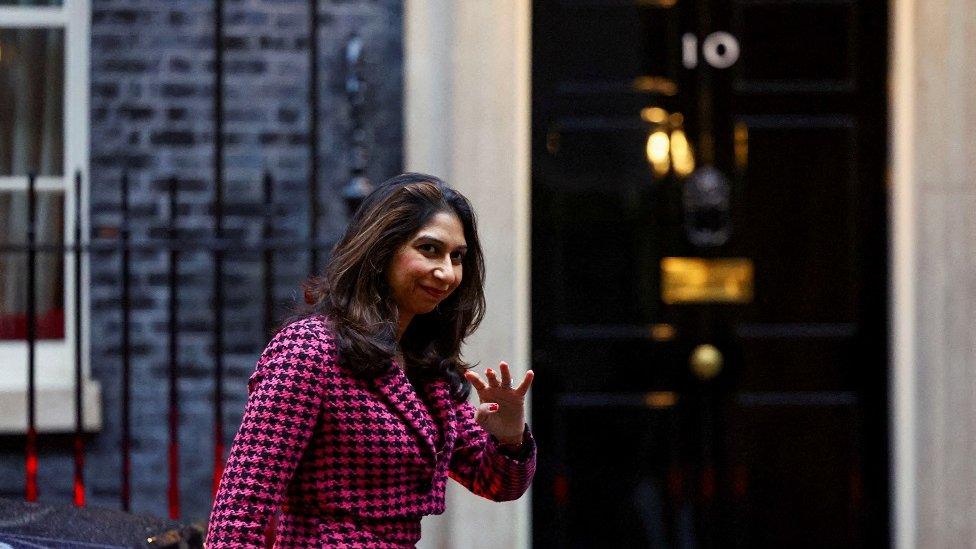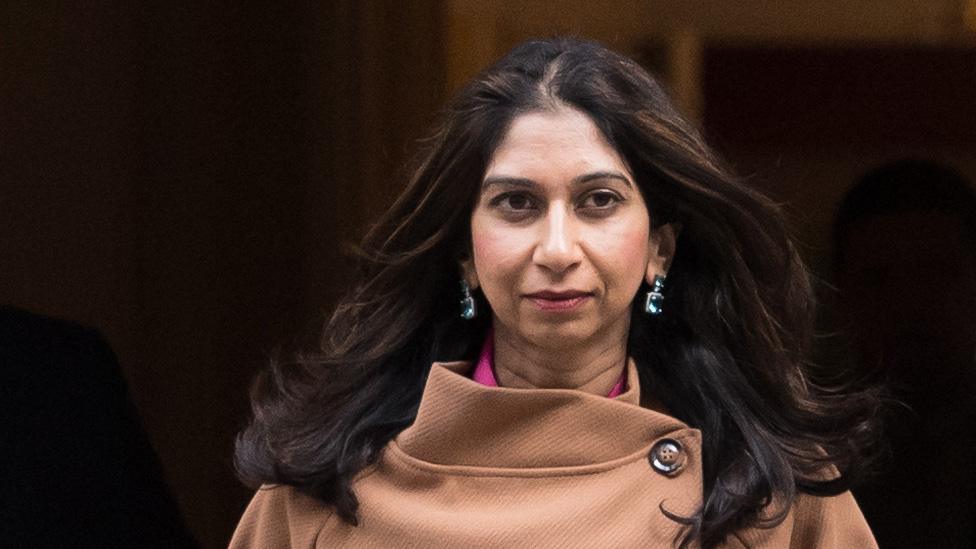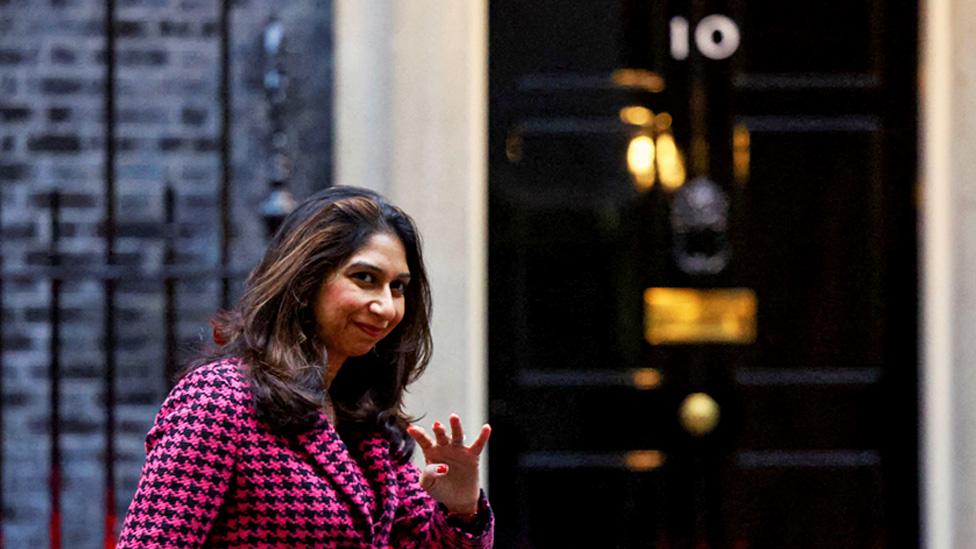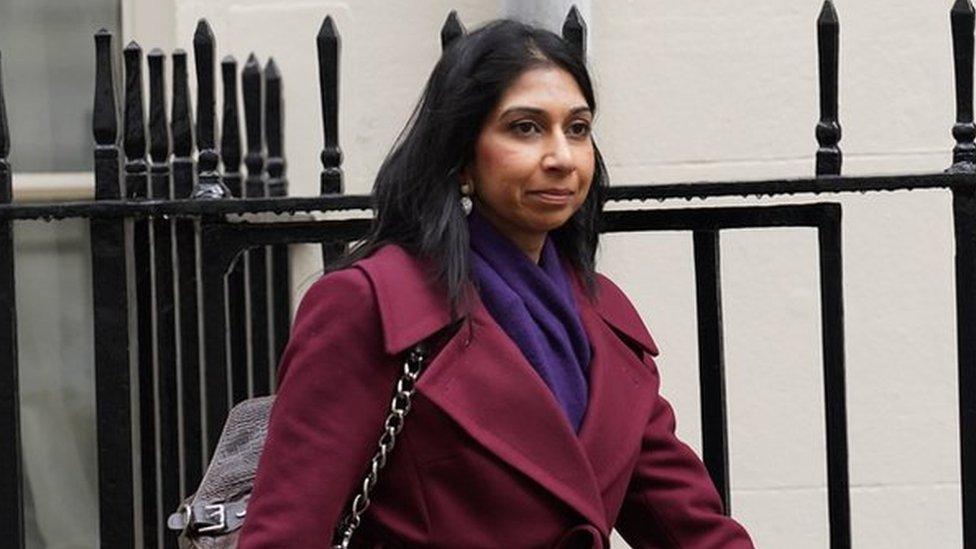Who is Suella Braverman?
- Published
Watch: Braverman's most controversial moments... in 68 seconds
Suella Braverman has been forced out as home secretary after challenging the prime minister one too many times.
She was sacked from the role on Monday morning.
In an article for the Times newspaper, she accused the Metropolitan Police of bias in the policing of protests.
Mrs Braverman was accused of undermining the police with her claim that aggressive right-wing protesters were "rightly met with a stern response", while "pro-Palestinian mobs" were "largely ignored", ahead of pro-Palestinian marches in central London.
The row is just the latest in a long line of controversies in Mrs Braverman's political career.
But it has not stopped her emerging as a leading figure on the right of the Conservative Party and someone with ambitions to lead it.
The now former home secretary's political leanings were evident at an early age. In 1997, the year of Labour's landslide victory, she won a mock election as the Conservative candidate at her independent all-girls school in Harrow.
A classmate at the time said she had turned the school "in completely the opposite direction" during the election, using her "personality, joviality and optimism".
Mrs Braverman was born Sue-Ellen Fernandes, in April 1980 - named after Sue-Ellen Ewing, the matriarch of the American TV show Dallas, one of her mother's favourite shows.
Teachers shortened it to Suella at school, where she was a high-flying student - crowning her time there as head girl.
Her parents were both of Indian origin, and met in London, after her father fled Kenya and mother emigrated from Mauritius to become a nurse.
She has spoken about how her parents' journey and emphasis on hard work and integration deeply influenced her.
This drive took her to study law at University of Cambridge, where she chaired the university's Conservative Association - a post held by Tory grandees (and former home secretaries) Ken Clarke and Michael Howard.
After Cambridge, she studied for two years in Paris, gaining a postgraduate degree in European and French law at Panthéon-Sorbonne University, and developing a love for the works of Marcel Proust and songs of Belgian singer Jacques Brel.
Political rise
Mrs Braverman's legal career took her from the UK to the US, passing the bar exam in both London and New York. She was also set on politics, gaining work as a lawyer for the government and unsuccessfully standing as the Conservative candidate in the solid Labour seat of Leicester East in 2005.
She was selected as the Conservative candidate for the safe seat of Fareham, a role she secured by doing the most "homework" according to a member of her selection panel.
In the 2015 election she was duly elected as an MP, and quickly made a name for herself for her views on the EU, immigration, and law and order.
A fervent supporter of Brexit, she chaired the Eurosceptic European Research Group (ERG) of Tory MPs, after the UK left the EU.
It was in the melee following the 2016 referendum that she headed to her ministerial office - getting a job as a junior minister at the Department for Exiting the European Union (DExEU).
She resigned from the role 10 months later, alongside her boss at DExEU Dominic Raab, in protest at Theresa May's Brexit deal, which she called "a betrayal".
She changed her name to Suella Braverman, having married South African business executive Rael Braverman in 2019.
Sir John Hayes, one of Mrs Braverman's oldest allies in politics, said Rael "reinforced" his wife's conservatism.

Mrs Braverman made a return to government when she was appointed attorney general by Boris Johnson, but maintained an independent streak.
As the chief legal adviser to the government, she was criticised by lawyers for backing the Internal Market Bill - setting post-Brexit customs and trade rules - which broke international law in a "specific and limited way".
She also made history in 2021 as the first cabinet minister to take maternity leave, following the passage of a new law.
Following Mr Johnson's resignation as prime minister, Mrs Braverman was the first to announce she was running to replace him.
She was installed as home secretary by eventual winner Liz Truss, but was forced to resign within the space of a few weeks.
Mrs Braverman stood down after admitting to sharing confidential documents.
Return to office
In a political twist, Mrs Braverman was reinstated as home secretary by Rishi Sunak - and under him, she has carved out a reputation for her headline-grabbing comments.
Not long after returning to office, it emerged she had been caught speeding while attorney general. Mr Sunak decided her request for advice from officials on arranging a private course "did not amount to a breach of the ministerial code" without the need for an investigation.
Mrs Braverman's comments have often proved a thorn in Mr Sunak's side, with the prime minister repeatedly distancing himself from her language on immigration and homeless people.
Until recently, Mr Sunak appeared unwilling to rein in his home secretary. There had been suggestions Mrs Braverman acted as a "politically useful pressure valve" for Mr Sunak - allowing him to indirectly signal approval for right-wing populist policies without having to make those statements himself.
Now her departure marks the end of a tumultuous period in government, but is unlikely to end her leadership ambitions.
Listen to Suella Braverman's interview on Political Thinking with Nick Robinson.
Related topics
- Published9 November 2023

- Published9 November 2023

- Published9 November 2023
- Published10 March 2023
